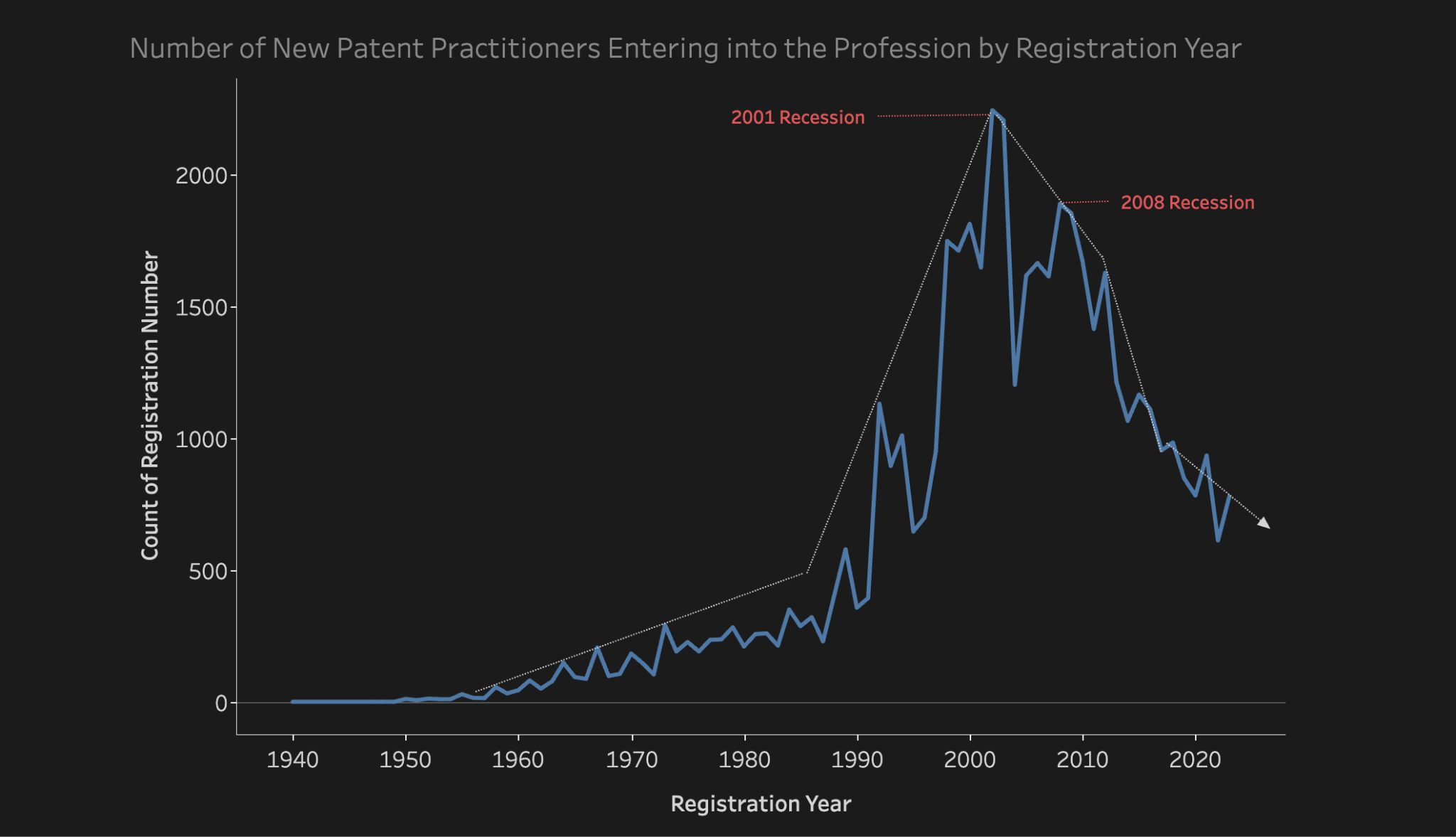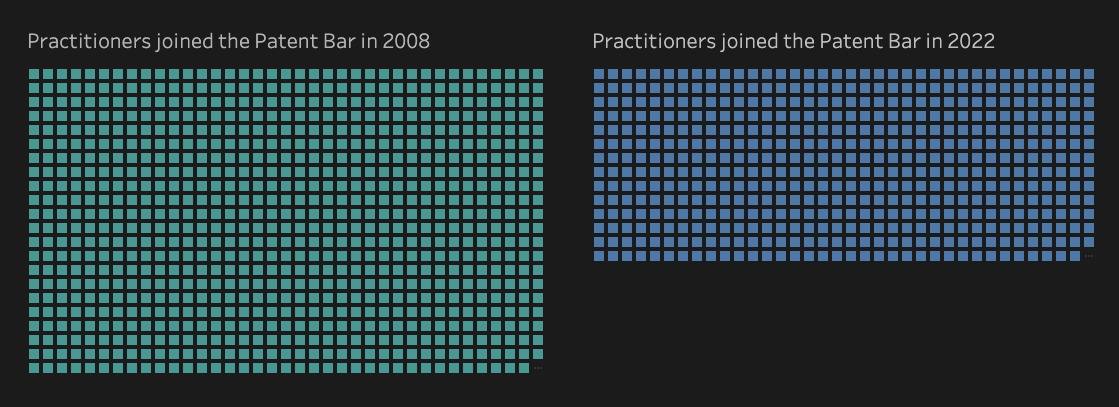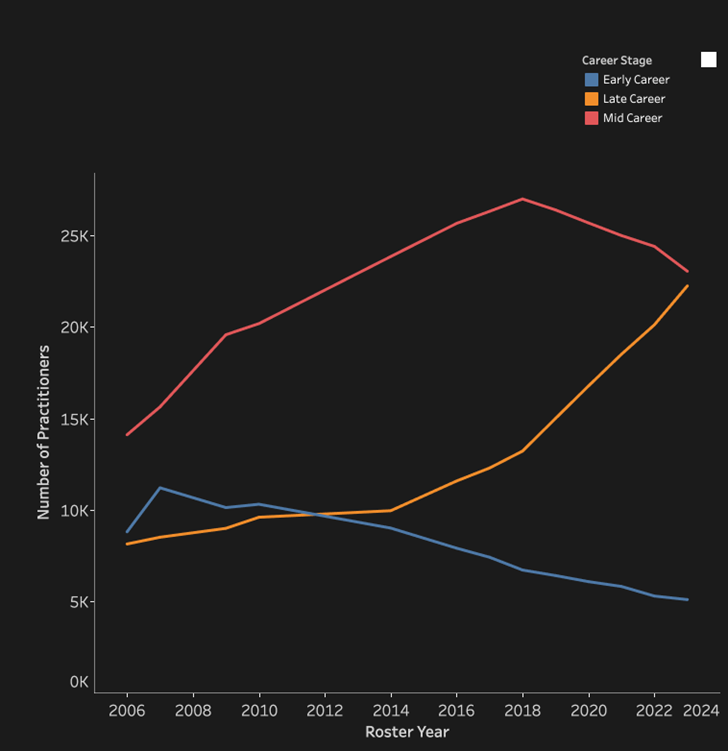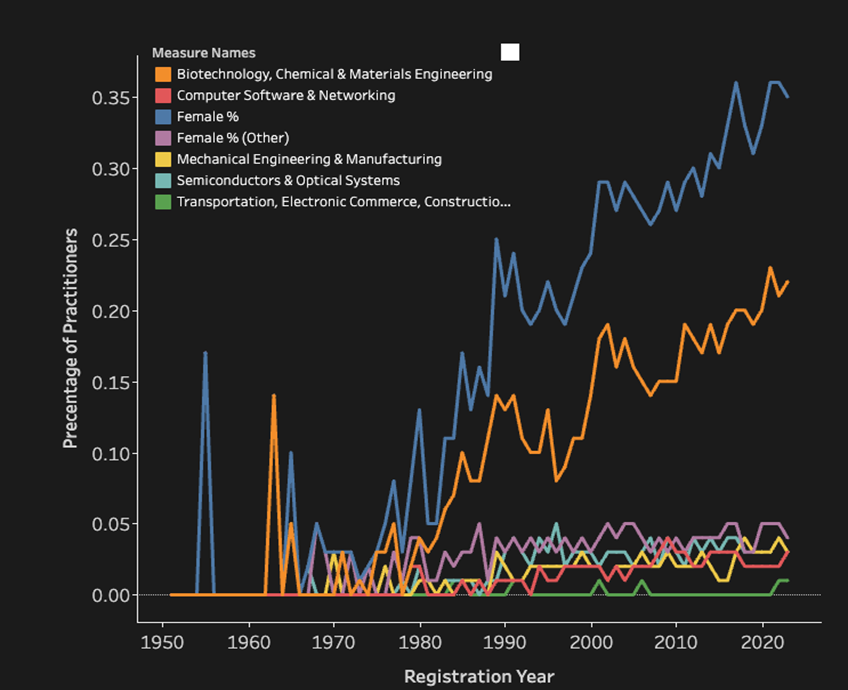Why an inclusive and diverse patent profession is the future

The patent profession is changing.
Sitting at the intersection of technology and law, patent practitioners are facing increasingly complex technology, a shifting legal landscape, and an exponential increase in demand as patent offices around the world log record filings.
Yet, another change is happening to the patent prosecution profession that is already impacting both law firms and in-house departments, and that is the decline in the number of new practitioners and the aging of the profession, at least in the United States.

Source: ADAPT Data
Since 2008, the number of new entrants to the patent bar administered by the United States Patent and Trademark Office has been decreasing year over year. In 2022, the number of new patent practitioners registered before the patent bar declined to a level not seen since 1995.

Source: ADAPT Data
The decline is more pronounced for attorneys entering into the patent bar than non-attorneys. In fact, for the first time in 2019, there were more non-attorneys entering into the patent bar than attorneys. The data mirrors what we see on the ground where law firms are having an increasingly difficult time recruiting from law schools and are creating new pipelines of talent from technical specialists in-house.
Perhaps the most concerning is that, due to the decrease of new entrants to the patent bar for the last 15 years, we are now seeing an aging trend in the profession. Since 2006, the patent bar has been undergoing a decrease of early career practitioners (five years or less of experience as measured from the date of patent bar registration). Since then, the patent bar is rapidly aging with continuous decline to the young practitioners population as well as mid-career practitioners (between five and 20 years of experience) and an increase in the percentage of late-career practitioners.

Source: ADAPT Data
Although we can speculate about the cause of the decline, one thing is certain: becoming a patent attorney is a long and arduous journey. Obtaining a technical degree is already difficult, especially for women and under-represented minorities, and layering on top the exclusivity of law schools and esoteric nature of patents as a subject matter, even in the best of times, patent practice is a challenging career to break into.
The decrease in registration, increased pace of innovation and the inherent difficulty of becoming a patent professional are the reasons why having a diverse, inclusive and sustainable patent talent pipeline is so important, now more than ever.
Closing the Gender Gap
Since the time of the first woman patent attorney, Edith Griswold (US Patent Bar Registration Number 26), there has been significant progress in women's representation at the US patent bar. Within the active practitioners of the US Patent Bar, 25.57% are likely to identify as women practitioners. Looking only at patent agent practitioners, 32.59% are likely to identify as women whereas 23.2% of attorney practitioners are likely to be women. Looking at new patent bar registrations in 2022, 36% of new practitioners were identified as women, making the class of 2022 the most gender diverse in the history of the patent bar.
The progress in gender representation is indeed something the profession should celebrate but digging into the data, a more complex picture emerges.
Although between 1978 to 2023 saw a period of rapid increase in gender representation - the rate of increase in the last 10 years stands at around 10% - in the last 5 years the rate of increase has stalled to near 0%.
Looking deeper, women practitioners tend to have studied sciences where 36% of practitioners with a science background are women versus 18% for engineering echoing the gender diversity as segmented by technical background. Furthermore, women practitioners are more likely to hold advanced degrees than men.

Source: ADAPT Data
Furthermore, looking at the technical background of the practitioners extrapolated from college or graduate school discipline of study and aligned with the USPTO examination units, the rate of increase in gender diversity is largely attributed to the increase in practitioners with biotechnology and chemistry background while other technology areas showed little to no change for the last 20 years.
What the patent profession should be doing
Even in the age of artificial intelligence, innovation is very much a human experience. To counsel inventors, to foster innovation, to ensure a sustainable IP ecosystem, we need a patent profession that embraces all.
To mitigate the decline of patent bar registration, we need to reach new populations that historically have not been aware of intellectual property as a concept and as a career. We need to show that it doesn't matter who you are, there is a meaningful and rewarding career waiting for you.
To continue to narrow the gender gap, and especially make meaningful impact to high tech and mechanical fields, we need to explore new solutions and engagements during early education stages.
We need to ensure those that are starting on the long journey to become patent practitioners have the support they need to be successful, and those already in the profession can thrive.
We need heroes to create the future of the patent profession.
The good news is there are heroes, there are in-house departments and law firms and service providers already doing the work. Many teams have already built hybrid in-house/law firm summer programmes, many are participating in mentorship and education programmes to reach out to the next generation, many are innovating new ways to help young professionals to jump start their career.
At ADAPT.legal, we believe that no matter how big or small your law firm or company is, you can be a hero to the future of the profession. By lowering the barrier to start or join meaningful programmes to help the next generation, forming meaningful connections between professionals and students, and leveraging technology to scale our collective impact, ADAPT hopes to empower you to be the hero for the patent profession.
Inclusivity Insights
Inclusivity Insights is a regular feature in which companies share stories, learnings, and experiences of their D&I journey related to IP and innovation with the IAM audience. Previous articles in the series:
Step-by-step methods to boost innovation diversity for women
How Microsoft is advancing diversity in inventorship
Using data to drive diversity at Spotify
Cisco Women’s Inventor Network leads to jump in female representation on patents
From gatekeeper to gateway: Pure Storage patent team continues to redefine inclusive innovation
Gender-name tool to change the game for patent diversity analysis
Neurodiversity and mental health: Celebrating difference in the IP profession
Finding ‘lost Einsteins’: US patent advisory committee calls for more diverse inventors
Corning’s journey toward applying a diversity and inclusion lens to IP
Increasing diversity in innovation sprints
Diversity, equity & inclusion matter: a son’s perspective
IP and innovation inclusion takes a village: a Meta perspective
How the Pure patent programme is engineered for inclusive innovation
Diversity pledge companies now number more than 50
Closing diversity gaps in patenting: current initiatives and the HP perspective
How Seagate is working to advance diversity and inclusion in patenting